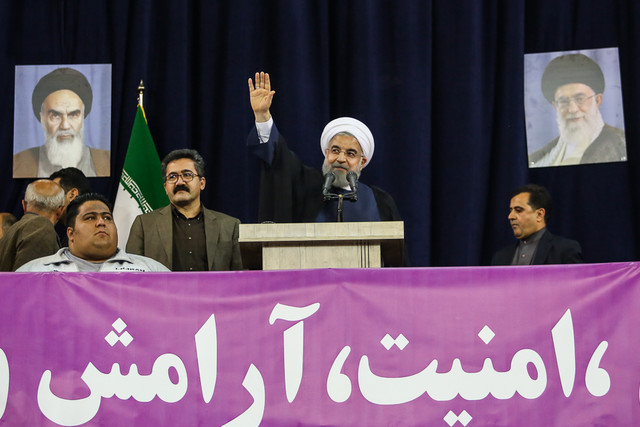The three main candidates in Iran’s May 19 Presidential election have stepped up attacks on each other.
President Hassan Rouhani (pictured) raised the stakes by bringing out the role of Ebrahim Raisi, thhttps://eaworldview.com/wp-admin/profile.phpe hardline cleric backed by the Supreme Leader, in the killing of about 5,000 political prisoners in 1988. The President said people do not want to elect a candidate who has been involved in “executions and imprisonments”.
Rouhani elevated his general pledge of opening up Iran’s political and cultural spheres, saying his opponents “just ban things” while the Iranian public “wants freedom”. He challenged Raisi, a former Attorney General in the hardline judiciary:
Please don’t talk about freedom of expression, and [don’t] put liberty at shame. Do not talk about the tolerance of criticism while nobody dares to criticize the body you are working for.
Rouhani aimed again at Raisi by questioning how anyone could comment on taxes when “they are not taxed themselves”.
Raisi, the head of the tax-exempt, billion-dollar Astan Quds Razavi religious foundation, maintained his focus on the economy with blame of the Rouhani Government’s “weakness” for an “unacceptable” unemployment rate, contrasting this with his promise to created 1 million jobs per year.
The cleric also claimed that the Government was not tackling corruption, amid the ongoing controversy over high salaries and bonuses for officials in the Government and State sectors:
We want to take down the wall between the people’s rights and the robbers. Are you angry because of the presence of competitors on the scene?…I feel that you are angry…at the workers who protest you or the poor who do not wish to endure you.
Rouhani struck back by noting the prominence of members of the Mahmoud Ahmadinejad Government (2005-2013), blamed for Iran’s economic woes, in Raisi’s campaign: “You must know that those who had taken over the country in that eight years are active [in the campaign], and you saw what they did to the youth and employment issue.”
Tehran Mayor Mohammad Baqer Qalibaf, a conservative, is also playing the economy card with his declaration of 5 million new jobs. Campaigning in Ahwaz in southwestern Iran on Wednesday, he blamed the Government for poor management for poverty and said he will strive to create “welfare, peace and security” for all people.
Portraying himself as a populist, Qalibaf repeated his demand to end “the government of the 4%”.
State Broadcaster Censors Rouhani Film
State broadcaster IRIB censored Rouhani’s campaign film, deleting references to former President Mohammad Khatami; Mir Hossein Mousavi, the leading candidate in the 2009 Presidential election who has been under strict house arrest since February 2011; and Mehdi Karroubi, a former Speaker of Parliament and 2009 candidate who has also been detained in an apartment for more than six years.
The 24-minute video was broadcast as scheduled at 6:30 p.m. However, the opening sequence was edited to limit the cheers and chants of Rouhani’s supporters at a rally.
In one of the deleted sections, a crowd of supporters shout “Long live Rouhani! Eternally Mousavi!” In a second, Rouhani says, “We filed a complaint with the judiciary, and we hope they see to it. We can at least hope.”
Rouhani’s Confrontation of the Revolutionary Guards
The campaign has also been distinguished by Rouhani’s confrontation of the Revolutionary Guards, and implicitly a Supreme Leader who is trying to contain him.
Guards commanders, including the head of the Iranian armed forces, reacted angrily to Rouhani’s statement in the second Presidential debate criticizing Iran’s ballistic missile testing after the January 2016 implementation of the nuclear agreement with the 5+1 Powers. The President denounced the provocative slogans on the missiles — a reference to the reported message of “Death to Israel”.
Armed Forces head Maj. Gen. Mohammad Hossein Bagheri maintained that the July 2015 nuclear deal does not cover the missile program and said there was no violation of a UN Security Council resolution.
The head of the paramilitary Basij Organization, Brig. Gen. Gholam Hossein Gheibparvar, said that the elimination of Israel is “one of our goals” and that “the free people around the world are proud” that Iran is standing up to Israel.
Rouhani confronted the Guards despite the Supreme Leader’s rebuke of the President’s approach of foreign engagement linked to Iranian economic recovery. Early in the campaign, Ayatollah Khamenei called on all candidates to promise that they would not rely on foreign powers.
Khamenei tried a new angle last week, barring any involvement in the UN agency UNESCO’s Education 2030 initiative.
The Rouhani Government and the the Supreme Council of the Cultural Revolution, chaired by the President, have backed the endeavor to “ensure inclusive and equitable education and promote lifelong learning opportunities for all”, with the President meeting UNESCO head Irina Bukova.
But Khamenei told his audience that the UN, a “so-called international organization under the influence of big powers”, cannot make decisions for nations with varying histories and cultures. He warned that Iran is “not a place for the faulty destructive corrupt Western lifestyle to infiltrate like this”.
(Hat tip to Iran News Round Up for translations)

